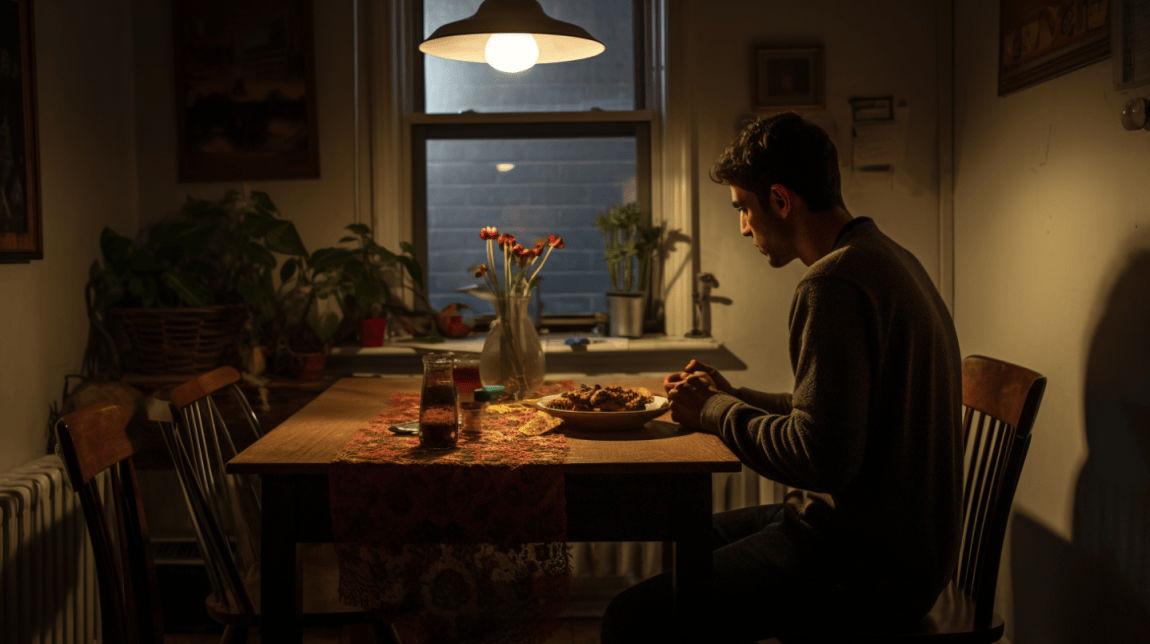Did you know that there is an increasing trend of men living alone worldwide? While some of this is a reaction to the MGTOW movement and a general response to rejecting the notion of women as equal and sometimes higher earning, better educated, and overall dominant members of a partnership - rather than the traditional subservient role the women have been told they needed to be for decades.
Whatever the reason though, research suggests that this lifestyle choice can have a significant impact on men's mental health. Social isolation and loneliness are common challenges faced by men who choose to live alone, affecting their overall well-being, mental health, gender differences, sex, alcohol consumption, and physical activity.
- Rising Trend of Men Living Alone: Increasing numbers of men are choosing to live alone worldwide, driven by various social and cultural factors, including reactions to gender dynamics and personal independence.
- Impact on Mental Health: Men who live alone often face challenges like social isolation and loneliness, which can significantly affect their mental health and overall well-being.
- Financial and Emotional Burdens: Solo living for men can lead to financial stress, lack of emotional support, and difficulty maintaining a work-life balance.
- Physical and Mental Health Risks: Living alone increases the vulnerability to health issues, including higher risks of depression, anxiety, and physical health problems due to limited social interactions and support structures.
- Opportunities for Personal Growth: Despite the challenges, living alone can offer men opportunities for independence, self-discovery, and personal development.
- Unique Challenges Faced by Men Living Alone
- Physical And Mental Health Challenges Of Solo Living
- Support Structures Needed By Men Living Solo
- Understanding Why More Men Are Living Alone
- Men vs Women Living Alone: Comparing The Trends
- Men Can Live Alone … But Solo Living Is More Than Just Housekeeping And Paying The Bills
Did you know that there is an increasing trend of men living alone worldwide? While some of this is a reaction to the MGTOW movement and a general response to rejecting the notion of women as equal and sometimes higher earning, better educated, and overall dominant members of a partnership - rather than the traditional subservient role the women have been told they needed to be for decades.
Whatever the reason though, research suggests that this lifestyle choice can have a significant impact on men’s mental health. Social isolation and loneliness are common challenges faced by men who choose to live alone, affecting their overall well-being, mental health, gender differences, sex, alcohol consumption, and physical activity.
This isn’t saying that men need a woman in the house to be healthy and mentally sound - however, having social companionship and someone to lean-on or simply talk to about the events of the day can have a therapeutic effect on men. It can help alleviate social isolation and promote physical activity.
Studies have shown that social integration and health behaviors play crucial roles in determining the psychosocial factors associated with living alone. In fact, studies have shown that men living alone face challenges such as lower levels of social support and less physical activity. These factors contribute to poorer health outcomes and higher mortality rates compared to those who live with others.
The effect of living alone on men’s mental health has been extensively explored in various research articles. The cohabitation of participants was studied. These studies shed light on the association between self-perceived loneliness, depression, and other mental health issues among participants in the study who choose to live solo.

Unique Challenges Faced by Men Living Alone
Living alone as a man comes with its own set of challenges and difficulties. From financial responsibilities to the lack of companionship, men face unique challenges and risk factors when navigating solo life, regardless of their marital status.
Too many men overestimate their ability to thrive without a social structure that offers emotional support and companionship. In addition, good advice is often dismissed by men who are conditioned to solve problems independently.
Financial responsibilities solely on one person:
Being the sole provider means shouldering all the financial burdens alone. Single men often have to manage bills, rent or mortgage payments, and other expenses without any assistance. This can lead to added stress and pressure in handling the finances effectively, putting persons at risk. Studies have shown that over the years, this can have a significant impact on their financial well-being.
Lack of emotional support and companionship:
Living alone can result in social isolation for many men. Without a partner or roommates, women may experience feelings of loneliness and a lack of emotional support. This can be especially true for persons who are single for many years and are at risk for social isolation. Having someone to share experiences with or lean on during tough times is something that men living alone often miss out on. The manifold time-sucking beauty of housekeeping and emotional labor can be burdensome.
Difficulty in maintaining a work-life balance:
Balancing work commitments with personal life can be challenging for anyone, but it can be particularly difficult for single men living alone. Finding time for leisure activities or self-care becomes more demanding with no one else at home to share household chores or responsibilities. After leaving a marriage, many women find independence appealing, contrasting with men's expressed difficulty in solitude and a desire for companionship. Living alone alleviates not only housekeeping but also emotional labor.
Men living alone face these problems daily, highlighting the importance of recognizing their needs and offering support whenever possible. Whether it’s through building stronger social networks or providing resources tailored specifically for solo living, addressing these challenges is crucial in ensuring the well-being of single men everywhere.
Remember: Men need a helping hand too!

Physical And Mental Health Challenges Of Solo Living
Living alone can have its challenges, especially for men. Let’s explore some of the potential risks and difficulties they may face:
Higher risk of depression and anxiety:
Men living alone are more prone to experiencing feelings of loneliness, which can contribute to higher rates of depression and anxiety. The lack of social support and limited interactions with others can take a toll on their mental well-being. Incorporating regular physical activity into their routine can help combat loneliness and promote better mental and physical health.
Limited social interactions leading to feelings of isolation:
Without regular social interactions, men living alone may feel isolated and disconnected from others. This can lead to a sense of loneliness, impacting their emotional health. Many men enjoy spending time alone but also seek affection and connection, which leads to a nuanced discussion about emotional needs and societal expectations.
Increased vulnerability to physical health problems due to lack of support:
Living alone means there is often no immediate assistance available in case of emergencies or health issues. Men may be at a higher risk for certain physical health problems due to the absence of support networks that could provide timely help.
Certain risk factors associated with cardiovascular diseases such as smoking or sedentary lifestyle choices might further exacerbate the situation. Men living alone need to be aware of these risks and take proactive measures towards maintaining good health.
Support Structures Needed By Men Living Solo
Men as well as women need support in life, that's just human. This can come in a variety of different ways, including family members, roommates, friends, and neighbors, or even just simply heading back home to live with your parents.
Family Members vs Roommates
Living by yourself doesn't have to mean getting married, it's ok for us guys to live with other men such as brothers and uncles or even female relatives. However, there's a key difference between living with someone who is a relative vs someone who is simply a roommate. Specifically, you can deal with a roommate by just walking away or having a candid conversation that may be needed to make things right. However, with relatives, that conversation can be much more complicated.
Friends and Neighbors
Friends and neighbors can also be a major source of support while still being able to have the freedom of solo living. For instance, a neighbor or close friend can help watch your place if you are gone on a long trip, or help move something heavy. They can also be there if you need a moment to vent .
Going Back Home vs Living By Yourself
For men who went to college or maybe moved away from home to pursue a career that didn't work out the way you'd hoped - going back home to live with your parents is an option that has become popular in recent years.
This can be an easy solution for men who are looking to save some money while planning for the future - for instance saving up to buy a home instead of renting. This doesn't mean you are weak or a failure. In many cases this is simply the responsible thing to do.

Understanding Why More Men Are Living Alone
Changing societal norms have led to more men choosing to live alone. This shift can be attributed to various factors such as widowhood, divorce, and a decline in traditional marriage expectations. Men are learning to enjoy their own company, navigating the emotional complexities and societal expectations that come with solitary life.
Living alone provides men with a sense of independence and self-discovery. It allows them the freedom to explore their own interests, pursue personal goals, and establish their identity outside of a partnership or family unit. There is an old saying that men desire multiple partners when financially stable, but this perception has shifted as more men find contentment in their independence.
Benefits Of Living Alone:
Many men enjoy living alone, here are some of the benefits that men living solo enjoy ...
| Benefit | Description |
|---|---|
| Independence | Complete control over daily routines, decision-making, and living space without needing to consider others. |
| Personal Growth | Opportunities for self-reflection, self-discovery, and pursuing personal interests and goals without external influences. |
| Financial Autonomy | Freedom to manage finances independently, prioritize spending, and save without the need to compromise. |
| Flexible Lifestyle | Ability to create a lifestyle that suits individual preferences, including work-life balance, hobbies, and social interactions. |
| Reduced Domestic Stress | Fewer household conflicts and responsibilities, with the ability to maintain the living environment as desired. |
There's also no reason in today's society why having multiple partners for sexual relations or even just companionship needs to be done so within the confines of a married relationship or partnership.
Opportunities for personal growth, self-reflection, and self-improvement are often easier when men live alone. They have the freedom, space and time to analyze their own thoughts, emotions, and behaviors without external influences. This introspection often leads to a deeper understanding of oneself and fosters personal development.
Older men are also embracing this trend of living alone. As they age, some may find themselves widowed or divorced, leading them to seek solace in independent living arrangements. Living alone allows older men to maintain their autonomy while adapting to life’s changes.
The analysis of historical data further supports the increasing prevalence of men living alone. Looking at past trends reveals a significant shift in societal attitudes towards single living arrangements for both genders.
Men vs Women Living Alone: Comparing The Trends
From a global perspective though, more women than men tend to live alone. This is particularly true amount older women as well as young professionals who no longer feel forced to get married early and have financial independence, allowing them to avoid seeking a man to take care of them.
Specifically, single women enjoy their freedom to live as they want to and make personal decisions independently, highlighting a contrast in lifestyle choices.
In the United States, for instance, the number of women living alone at age 30 jumped from 1.8% in 1960 to 7.8% in 2018! The number of US men living alone at age 30 also increased from 3% to 11% in 2018.
In that same time, the percentage of one-person households jumped from 13.10% to 28% in 2018. This trend is seen in other industrialized cultures as well (such as Japan) as well though the jump seen in the United States was the most significant between 1960 and 1980, while countries in Eastern Europe and Latin America have increased more recently.
This trend can be attributed to various socio-cultural norms and expectations. For instance, in certain societies, there may be a greater emphasis on women’s independence and empowerment, leading to higher rates of women choosing to live alone.
Men Can Live Alone … But Solo Living Is More Than Just Housekeeping And Paying The Bills
Yes, men can live alone as long as they are financially able. Physical needs in terms of sex, cooking, cleaning, even conversation can all be outsourced, delivered, or engaged with virtually through the Internet and various apps.
Living alone as a man certainly has its perks. You have complete control over your space, schedule, and decisions without having to consider anyone else. However, there are undeniable benefits to having a partner or even a roommate to share life experiences. Let's explore the advantages of having someone to share your living space with.
Having a partner or roommate may not be for everyone, but it's important to consider the benefits of sharing your living space. From emotional support and shared responsibilities to financial benefits and personal growth, having someone by your side can enrich your life in numerous ways. So, whether you choose to live alone or seek a companion, weigh the pros and cons to make an informed decision that suits your lifestyle and preferences.
Hey James Hills wants you to share this!

